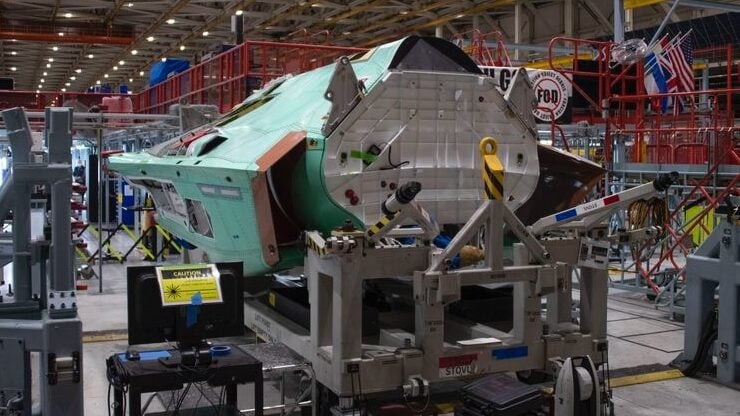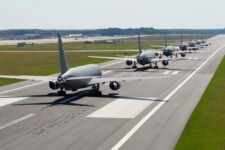
This is the 900th central fuselage for an F-35 made by Northrop Grumman. (Northrop Grumman)
SYDNEY — As Australia’s military presses to increase its ability to make parts, munitions and some weapons on its own soil, Northrop Grumman has inked a six-year agreement to buy key parts for the F-35 central fuselage from an Aussie supplier.
The agreement with Quickstep Holdings Ltd. is for work that will be done at the 16,000 square meter composite manufacturing plant at Bankstown Airport here in Sydney. The company, which employs more than 280 people in Australia and overseas, uses advanced autoclaves to produce the advanced composites used for the F-35 and other aircraft. The company will do at least $105 USD million in business with Northrop and that may grow to $195 million for future lots of the fuselage over the life of the agreement.
“Northrop Grumman has an unwavering commitment to help grow Australia’s sovereign defence industry,” Christine Zeitz, general manager of Northrop Grumman Asia Pacific, said in a statement. “Quickstep Holdings is a long-time member of our global supply chain, providing critical capability into one of the Australian Defence Force’s (ADF) most important programs, and we look forward to continuing our collaboration over the coming years.”
Northrop manufactures the center fuselage section for all three F-35 variants built by Lockheed Martin, and over the years, Quickstep has grown to become Northrop Grumman’s largest Australian supplier for the Joint Strike Fighter. Quickstep also does work on the F-35 tail. According to Lockheed, prime contractor for the plane, Australian companies have been awarded F-35 contracts worth $2.7 AUD billion, powering some 2,400 high-tech manufacturing jobs here.
Canberra has emphasized the need for more production in Australia not just for the financial benefits, but for the strategic reality that supply lines off the island nation would likely be the first target in a conflict. Underlining that point, a defense expert at the Lowy Institute noted in The Australian newspaper yesterday that Australia would run out of ammunition in a very short time should it go to war.
“We still import most of our major defence equipment,” wrote Alan Dupont, chief executive of the Cognoscenti Group and a non-resident fellow at the institute. “Our naval shipbuilding industry is in disarray. Australian companies are bit players in a defence industry dominated by big overseas prime contractors. And we have no defence industry strategic plan or a funding model that meets our needs and provides a pathway to greater defence self-reliance. Israel and Sweden, both smaller than us, have built world-class defence industries.”
In particular, Dupont pointed to South Korea’s defense industry, which he said “has come from nowhere to become a defence export powerhouse. Seoul’s defence exports are expected to reach $16bn this year, equivalent to one-third of our defence budget. They include $1bn worth of artillery and ammunition resupply vehicles for the Australian Army.”
The government appears to support the general idea of becoming more self-reliant, as the minister for defense industry noted in a statement about the Northrop agreement.
“Growing our nation’s industrial base is vital to meeting the ongoing and future capability needs of the ADF, as well as supporting the next generation of game-changing technologies,” Pat Conroy said. “Partnerships like this between a global defence company and an Australian business have an important role to play.”
More than 70 directly-contracted Australian businesses have made “significant contributions to the design and development phases of the F-35,” according to the Northrop release. Australia was an original partner in the program and is buying 72 F-35As.






















